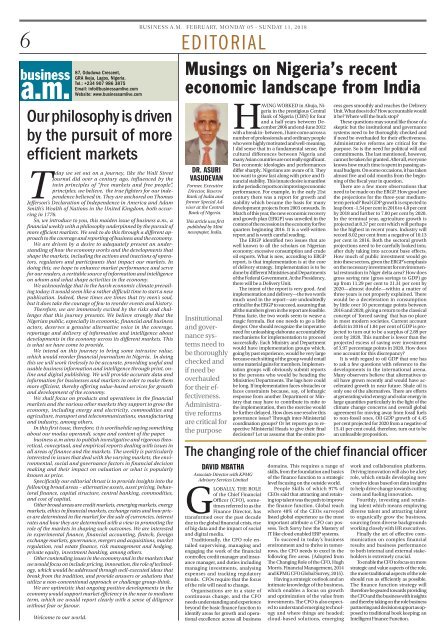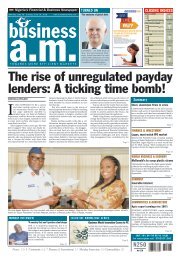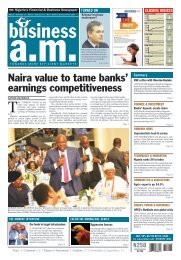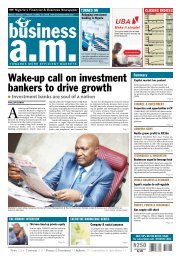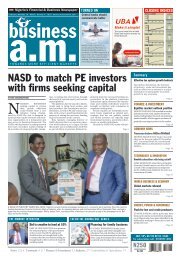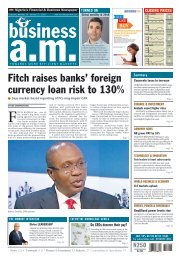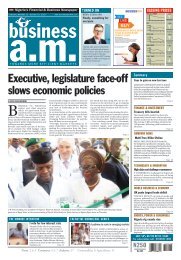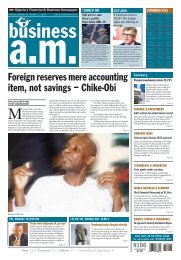You also want an ePaper? Increase the reach of your titles
YUMPU automatically turns print PDFs into web optimized ePapers that Google loves.
6<br />
<strong>BUSINESS</strong> A.M. <strong>FEB</strong>RUARY, MONDAY 05 - SUNDAY 11, <strong>2018</strong><br />
EDITORIAL<br />
business<br />
a.m.<br />
Our philosophy is driven<br />
by the pursuit of more<br />
efficient markets<br />
Today we set out on a journey, like the Wall Street<br />
Journal did over a century ago, influenced by the<br />
twin principles of “free markets and free people”,<br />
principles, we believe, the true fighters for our independence<br />
believed in. They are anchored on Thomas<br />
Jefferson’s Declaration of Independence in America and Adam<br />
Smith’s Wealth of Nations in the United Kingdom, both occurring<br />
in 1776.<br />
So, we introduce to you, this maiden issue of business a.m., a<br />
financial weekly with a philosophy underpinned by the pursuit of<br />
more efficient markets. We seek to do this through a different approach<br />
to the coverage and reporting of business and the economy.<br />
We are driven by a desire to adequately present an understanding<br />
of how the economy works and the developments that<br />
shape the markets, including the actions and inactions of operators,<br />
regulators and participants that impact our markets. In<br />
doing this, we hope to enhance market performance and serve<br />
for our readers, a veritable source of information and intelligence<br />
on whom and what shape activities in the economy.<br />
We acknowledge that in the harsh economic climate prevailing<br />
today; it would seem like a rather difficult time to start a new<br />
publication. Indeed, these times are times that try men’s soul,<br />
but it does take the courage of few to reorder events and history.<br />
Therefore, we are immensely excited by the risks and challenges<br />
that this journey presents. We believe strongly that the<br />
Nigerian public, especially its economic, financial and business<br />
actors, deserves a genuine alternative voice in the coverage,<br />
reportage and delivery of information and intelligence about<br />
developments in the economy across its different markets. This<br />
is what we have come to provide.<br />
We intend on this journey to bring some intrusive value,<br />
which would reorder financial journalism in Nigeria. In doing<br />
this we will work tirelessly to be accurate, providing useful and<br />
usable business information and intelligence through print, online<br />
and digital publishing. We will provide accurate data and<br />
information for businesses and markets in order to make them<br />
more efficient, thereby offering value-based services for growth<br />
and development of the economy.<br />
We shall focus on products and operations in the financial<br />
markets and the various other markets they support to grow the<br />
economy, including energy and electricity, commodities and<br />
agriculture, transport and telecommunications, manufacturing<br />
and industry, among others.<br />
In this first issue, therefore, it is worthwhile saying something<br />
about our modus operandi, scope and content of the paper.<br />
business a.m aims to publish investigative and rigorous theoretical,<br />
conceptual, and empirical reports dealing with issues in<br />
all areas of finance and the markets. The weekly is particularly<br />
interested in issues that deal with the varying markets, the environmental,<br />
social and governance factors in financial decision<br />
making and their impact on valuation or what is popularly<br />
known as price.<br />
Specifically our editorial thrust is to provide insights into the<br />
following broad areas – alternative assets, asset pricing, behavioral<br />
finance, capital structure, central banking, commodities,<br />
and cost of capital.<br />
Other broad areas are credit markets, emerging markets, energy<br />
markets, ethics in financial markets, exchange rates and how prices<br />
are determined in the market for the sale of currencies, interest<br />
rates and how they are determined with a view to promoting the<br />
role of the markets in shaping such outcomes. We are interested<br />
in experimental finance, financial accounting, fintech, foreign<br />
exchange markets, governance, mergers and acquisitions, market<br />
regulation, real estate finance, risk management and hedging,<br />
private equity, investment banking, among others.<br />
Other contending issues in the economy and in the markets that<br />
we would focus on include pricing, innovation, the role of technology,<br />
which would be addressed through well-executed ideas that<br />
break from the tradition, and provide answers or solutions that<br />
utilize a non-conventional approach or challenge group-think.<br />
We are optimistic that ongoing positive developments in the<br />
economy would support market efficiency in the near to medium<br />
term, which we would report clearly with a sense of diligence<br />
without fear or favour.<br />
Welcome to our world.<br />
87, Oduduwa Crescent,<br />
GRA Ikeja, Lagos, Nigeria.<br />
Tel.: +234 907 986 3875<br />
Email: info@businessamlive.com<br />
Website: www.businessamlive.com<br />
Musings on Nigeria’s recent<br />
economic landscape from India<br />
DR. ASURI<br />
VASUDEVAN<br />
Former, Executive<br />
Director, Reserve<br />
Bank of India and<br />
former Special Adviser<br />
at the Central<br />
Bank of Nigeria.<br />
This article was first<br />
published by Mint<br />
newspaper, India.<br />
Institutional<br />
and governance<br />
systems<br />
need to<br />
be thoroughly<br />
checked and<br />
if need be<br />
overhauled<br />
for their effectiveness.<br />
Administrative<br />
reforms<br />
are critical for<br />
the purpose<br />
The changing role of the chief financial officer<br />
DAVID MBATHA<br />
Associate Director with KPMG<br />
Advisory Services Limited<br />
GLOBALLY, THE ROLE<br />
of the Chief Financial<br />
Officer (CFO), sometimes<br />
referred to as the<br />
Finance Director, has<br />
transformed over the past decade<br />
due to the global financial crisis, rise<br />
of big data and the impact of social<br />
and digital media.<br />
Traditionally, the CFO role entailed<br />
supervising, managing and<br />
engaging the work of the financial<br />
controller, credit manager and insurance<br />
manager, and duties including<br />
managing investments, analysing<br />
expenses and tracking regulatory<br />
trends. CFOs require that the focus<br />
of the role will need to change.<br />
Organisations are in a state of<br />
continuous change, and the CFO<br />
needs understanding and experience<br />
beyond the basic finance function to<br />
identify areas for growth and operational<br />
excellence across all business<br />
HAVING WORKED in Abuja, Nigeria<br />
in the prestigious Central<br />
Bank of Nigeria (CBN) for four<br />
and a half years between December<br />
2006 and end-June 2012<br />
with a break in- between, I have come across a<br />
number of professionals and ordinary people<br />
who were highly motivated and well-meaning.<br />
I did sense that in a fundamental sense, the<br />
cultural differences between Nigeria and<br />
many Asian countries are not really significant.<br />
But economic ideologies and performances<br />
differ sharply. Nigerians are aware of it. They<br />
too want to grow fast along with price and financial<br />
stability. This innate desire is manifest<br />
in the periodic reports on improving economic<br />
performance. For example, in the early 21st<br />
century there was a report for growth and<br />
stability which became the basis for many<br />
development projects from 2003 onwards. In<br />
March of this year, the new economic recovery<br />
and growth plan (ERGP) was unveiled in the<br />
context of the recession in the economy for five<br />
quarters beginning 2016. It is a well-written<br />
report and is worth careful reading.<br />
The ERGP identified two issues that are<br />
well known to all the scholars on Nigerian<br />
economy: excessive consumption and crude<br />
oil exports. What is new, according to ERGP<br />
report, is that implementation is at the core<br />
of delivery strategy. Implementation is to be<br />
done by different Ministries and Departments<br />
of the Federal Government. At the Presidency,<br />
there will be a Delivery Unit.<br />
The intent of the report is very good. And<br />
implementation and delivery—the two words<br />
much used in the report—are undoubtedly<br />
critical for the ERGP to succeed, assuming that<br />
all the numbers given in the report are feasible.<br />
Prima facie, the two words seem to weave a<br />
magic formula. But one needs to go a little<br />
deeper. One should recognize the imperative<br />
need for unleashing elaborate accountability<br />
mechanisms for implementation to proceed<br />
successfully. Each Ministry and Department<br />
would have implementation groups which,<br />
going by past experience, would be very large<br />
because each sitting of the group would entail<br />
some material gains for members. Implementation<br />
groups will obviously submit reports<br />
to the persons who would be heading the<br />
Ministries/Departments. The lags here could<br />
be long. If implementation faces obstacles or<br />
faces constraints because, say, of lethargic<br />
response from another Department or Ministry<br />
that may have to contribute its mite to<br />
the implementation, then the exercise would<br />
be further delayed. How does one resolve this<br />
governance issue? Through inter-Ministerial<br />
coordination groups? Or let reports go to respective<br />
Ministerial Heads to give their final<br />
decisions? Let us assume that the entire pro-<br />
domains. This requires a range of<br />
skills, from the foundation and basics<br />
of the finance function to a strategic<br />
level focusing on the outside world.<br />
People Skills of which 97% of<br />
CEOs said that attracting and retaining<br />
top talent was the path to improve<br />
the finance function. Global reach<br />
where 48% of the CEOs surveyed<br />
listed global experience as the most<br />
important attribute a CFO can possess.<br />
Tech Savvy how the Mastery of<br />
IT like cloud enabled ERP systems.<br />
To succeed in today’s business<br />
environment and to thrive in tomorrows,<br />
the CFO needs to excel in the<br />
following five areas. (Adopted from<br />
The Changing Role of the CFO, Hugh<br />
Morris. Financial Management, 2014<br />
and KPMG CFO Global Survey, 2015).<br />
Having a strategic outlook and an<br />
intimate knowledge of the business,<br />
which enables a focus on growth<br />
and optimization of the value from<br />
investments. The CFO is also expected<br />
to understand emerging technology<br />
and where things are headed;<br />
cloud-based solutions, emerging<br />
cess goes smoothly and reaches the Delivery<br />
Unit. What does it do? How accountable would<br />
it be? Where will the buck stop?<br />
These questions may sound like those of a<br />
skeptic but the institutional and governance<br />
systems need to be thoroughly checked and<br />
if need be overhauled for their effectiveness.<br />
Administrative reforms are critical for the<br />
purpose. So is the need for political will and<br />
commitments. The last mentioned, however,<br />
cannot be taken for granted. After all, everyone<br />
knows how much time is spent in passing annual<br />
budgets. On some occasions, it has taken<br />
almost five and odd months from the beginning<br />
of the fiscal year in question.<br />
There are a few more observations that<br />
need to be made on the ERGP. How good are<br />
the projections for the three-year mediumterm<br />
period? Real GDP growth is expected to<br />
leap from -1.54 per cent in 2016 to 4.8 per cent<br />
by <strong>2018</strong> and further to 7.00 per cent by 2020.<br />
In the terminal year, agriculture growth is<br />
projected at 8.37 per cent which will perhaps<br />
be the highest in recent years. Industry will<br />
record 8.02 per cent from a negative of 10.13<br />
per cent in 2016. Both the sectoral growth<br />
projections need to be carefully looked into,<br />
after duly taking into account base effects.<br />
How much of public investment would go<br />
into these sectors, given the ERGP’s emphasis<br />
on the necessary investment for environmental<br />
restoration in Niger delta area? How does<br />
gross saving rate (gross savings to GDP) go<br />
up from 11.29 per cent to 21.31 per cent by<br />
2020—almost double—within a matter of<br />
three years is not properly explained. There<br />
would be a deceleration in consumption<br />
by little over 10 percentage points between<br />
2016 and 2020, giving a return to the classical<br />
concept of ‘forced saving’ that has no place<br />
in most modern societies. Current account<br />
deficit in 2016 of 1.84 per cent of GDP is projected<br />
to turn out to be a surplus of 2.89 per<br />
cent by 2020. This number is lower than the<br />
projected excess of saving over investment<br />
of 3.97 percentage points in 2020. How does<br />
one account for this discrepancy?<br />
It is with regard to oil GDP that one has<br />
to ask a few questions with reference to the<br />
developments in the international arena.<br />
Many observers believe that alternatives to<br />
oil have grown recently and would have accelerated<br />
growth in near future. Shale oil is<br />
only one of the alternatives. There are efforts<br />
at generating wind energy and solar energy in<br />
large quantities particularly in the light of the<br />
climate change concerns and overall global<br />
agreement for moving away from fossil fuels<br />
to non-fossil ones. Oil GDP growth of 4.45<br />
per cent projected for 2020 from a negative of<br />
15.41 per cent could, therefore, turn out to be<br />
an unfeasible proposition.<br />
work and collaboration platforms.<br />
Driving innovation will also be a key<br />
role, which entails developing new<br />
creative ideas based on data insights<br />
to help drive change towards cutting<br />
costs and fueling innovation.<br />
Fourthly, investing and retaining<br />
talent which means employing<br />
diverse talent and attracting talent<br />
to organically grow the business,<br />
sourcing from diverse backgrounds<br />
working closely with HR executives.<br />
Finally the art of effective communication<br />
on complex financial<br />
results and business performance<br />
to both internal and external stakeholders<br />
is extremely crucial.<br />
To enable the CFO to focus on more<br />
strategic and value aspects of the role,<br />
the more traditional aspects of the role<br />
should run as efficiently as possible.<br />
The finance function strategy will<br />
therefore be geared towards providing<br />
the CFO and the business with insights<br />
and thereby taking on the role business<br />
partnering and decision support as opposed<br />
to traditional book keeping; an<br />
Intelligent Finance Function.


